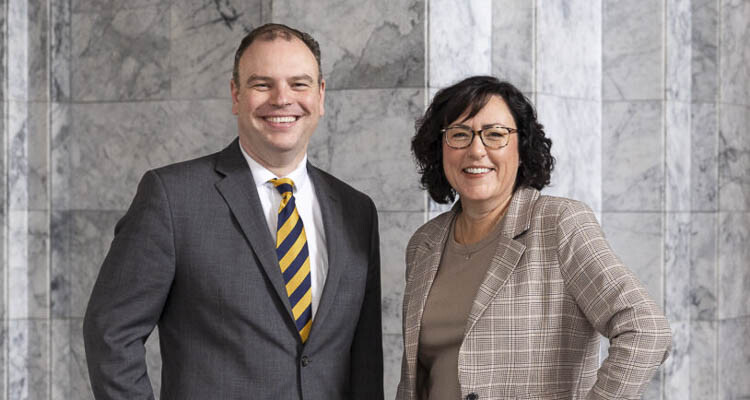
The biennial construction, repair, and infrastructure funding plan, Senate Bill 5949, appropriates a total of $1.33 billion in funding
The Washington State House of Representatives unanimously approved the state’s 2024-25 supplemental capital budget Wednesday (March 6). The biennial construction, repair, and infrastructure funding plan, Senate Bill 5949, appropriates a total of $1.33 billion in funding.
Reps. Greg Cheney and Stephanie McClintock, who helped secure 18th District project funding, were pleased to see that many important projects in their district will be moving forward, including:
- $16.2 million for the Madrona Recovery 54-bed facility.
- $400,000 for the Battle Ground Health Care Clinic.
- $309,000 for the Battle Ground Senior Center.
- $258,000 for the district Distributed Antenna System installation.
- $173,000 for the Florence Robison North Park equipment replacement.
- $50,000 for Glenwood Little League facility improvements.
- $515,000 for the Wallace Heights septic elimination project.
“I’m happy to see our 18th District get the assistance it needs, especially the Madrona Recovery center,” said McClintock, R-Vancouver. “This project is vital to everyone in Southwest Washington. Adding 54 more beds for youth who struggle with substance abuse and behavioral health problems is a game-changer for Clark County, and really, the entire state. We are grateful to get this important funding for our district.”
Cheney, R-Battle Ground, also expressed his appreciation for the funding for each of these projects, saying: “These district-funded projects underscore our commitment to addressing pressing needs such as behavioral health and recovery, while also contributing to community development projects and infrastructure. It has been a privilege to collaborate with my colleagues in delivering tangible benefits to our constituents.”
The final 2024-25 supplemental capital budget will spend $1.33 billion, with $130.6 million coming from the sale of general obligation bonds. The remaining $1.2 billion is from a combination of Climate Commitment Act accounts, Common School Construction Fund, and other state and federal accounts. It leaves $547,000 in bond capacity.
The budget makes significant investments in K-12 school construction, behavioral health and substance abuse treatment facilities, housing, early learning facilities, infrastructure, and other projects in local communities across the state. Highlights of the 2042-25 supplemental capital budget include:
- $148.8 million for behavioral health and substance abuse treatment, for new community capacity, institutional or state-run capacity, and upgrades and maintenance to existing facilities.
- $183.64 million for housing, with maintenance and upgrades for new housing units as well as upgrades to existing units.
- $128.64 million for new housing projects.
- $335.2 million for K-12 school construction, not including reduction in SCAP for projects that did not materialize or move forward.
- $127.86 million for higher education.
- $210.87 million for natural resources.
“This budget stands as a testament to the power of collaboration and bipartisan effort,” added Cheney. “Through strategic advocacy for projects and allocation of funds, we’re not only investing infrastructure and community services but also in the future of the 18th District and all of Washington.”
“Every one of these projects is important to the people of our district and they will all have a significant impact in our communities,” concluded McClintock.
The 2024 legislative session is scheduled to conclude on Thursday, March 7.
Information provided by Washington State House Republicans,
houserepublicans.wa.gov
Also read:
- Rep. John Ley supports C-TRAN Bus Rapid Transit to save Washington moneyRep. John Ley praised C-TRAN’s new BRT line as a faster, lower-cost alternative to light rail, urging support for transit options that save taxpayers money and improve service.
- C-TRAN, WSU Vancouver celebrates groundbreaking for The Vine on Highway 99C-TRAN and WSU Vancouver broke ground on the Vine’s Highway 99 route, a 9-mile bus rapid transit line connecting the university to downtown Vancouver and the Waterfront, set to open in 2027.
- Letter: The Charterist III — Concerning the powers of the Legislative BranchJohn Jay continues his Charterist series, arguing that Clark County’s legislative branch is structurally weak and lacks the resources to balance the executive, calling for reform in the next charter review.
- C-TRAN board again postpones vote on light rail operations and maintenance costsThe C-TRAN board again postponed a vote on language regarding operations and maintenance costs tied to light rail expansion, with pending lawsuits involving Michelle Belkot continuing to impact board actions.
- Opinion: ‘Today’s Democratic Party is not our father’s Democratic Party’Editor Ken Vance reflects on how today’s Democratic Party diverges from the values he associates with his father’s generation, citing issues like taxation, gender policies, and shifting ideology in Washington state politics.
- Opinion: ‘The Interstate Bridge project lacks billions in funding from both Oregon and Washington’Lars Larson criticizes Oregon’s funding decisions, highlighting the billions missing from both states for the Interstate Bridge replacement project and calling it a dead-end effort lacking Coast Guard approval.
- Court rules against Save Vancouver Streets A judge has ruled against Save Vancouver Streets in its legal effort to place a street-use initiative on the ballot. The group is considering whether to appeal.











